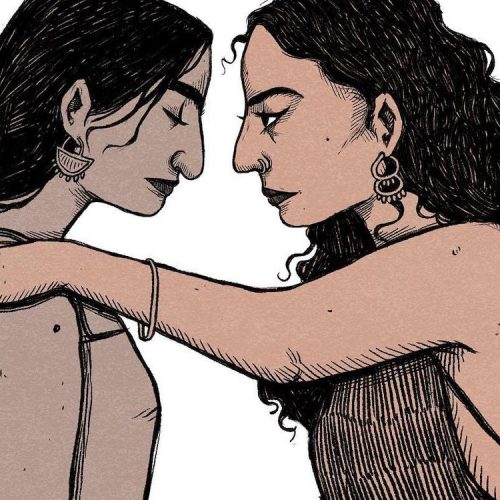No matter how conservative or liberal Arab parents might be; the love lives of young Arabs are still widely accepted as an unspoken taboo in most families—particularly when we’re not dating the “right” person.
Sometimes, because of parental expectations, falling in love can oddly feel like a betrayal, forcing us to keep partners invisible.
It puts additional pressure on your relationship when your parents try and dictate who you should love. When the relationship fails, you don’t even have someone to go and cry to because you had to hide it from them the whole time.
Most young Arabs grow up close to their parents; but because our collectivist community places a primacy on family loyalty, the downfall is that we choose to keep things secret (and often suffer in silence) instead of confronting their (often archaic) prejudices.
We asked five young Arabs how they healed from a breakup they couldn’t tell their parents about.
Faris, Iraqi
“I never discussed love at home. My first breakup happened after I travelled around Europe when I was 20. I met a guy and we stayed together three weeks in total. After the trip, I was supposed to go and visit him in Spain. But I slowly realised he was lying; he was in fact Mexican and broke up with me via email during the Christmas holiday. At the time, we didn’t have internet at home so I had to go to university everyday to check my emails and my mother noticed something was weird. I looked really numb, but she wouldn’t speak to me about it. No one knew about my orientation at this point and so I had to find support on the internet, with strangers. Even my parents’ issues (my dad had left the household) weren’t discussed at home, so obviously I couldn’t discuss mine and it took me six months to get through it.”
Salma, Tunisian
“Although my parents are very progressive (and I’m actually closer to my father), love is the one thing we don’t discuss. But thinking about it, love isn’t something I want to discuss with them. I still live with my parents, and because of that, I share many things with them, so my love life is what I choose to keep to myself. It’s the space where I feel autonomous and independent. When I went through my breakup, I was sad and I wished my father could have been more open about what I was going through, because I felt like I needed to speak to a man and have a male perspective so things could maybe make more sense to me. But at home, it’s accepted that we “solve these things ourselves”. My breakup was painful and sad because my boyfriend wasn’t so “traditional”, I felt like nobody could really identify with what I was going through. For a few weeks, I spent most of time at a friend’s house, literally crying and listening to Disney songs.”
Khaled, Moroccan
“I feel like love isn’t a topic that really has its place in the family sphere, particularly as my orientation is different to that of my heterosexual sisters, who are already discrete about their relationships. I don’t lie and hide things—that would be too toxic—but I just don’t discuss them. When my ex broke up with me it felt really frustrating not telling them though, and it was a very hard time for me. They saw my pain but couldn’t fully grasp the situation. It’s so weird having to navigate such intense feelings and having to remain silent at home, while it’s supposed to be a place where you find safety and support. It’s the total opposite at mine; I’m constantly walking on eggshells, somehow living a double life. It has forced me to withdraw into myself, forge an armour and curl up inside. I’m not sure it’s very healthy and I constantly ask myself, why is it so hard for us to speak about love in our societies?”
Alicia, Lebanese
“The reason I don’t speak about my relationships at home is because we don’t have the same vision, so I prefer not telling them about my love life. The generation gap makes things awkward; we don’t speak the same language. But going through my breakup was tough because I had to constantly pretend like nothing was wrong and come up with stupid alibis. Instead of really embracing the pain and letting it all out, I had to stop myself from crying and being sad just because my parents were around. Spending time alone, focusing on myself and reading books is how I eventually went through it.”
Sarah, Emirati
“When I first started secretly dating my ex-boyfriend, I found it exciting. But quickly, it became exhausting and just weird, because it felt like I was teenager again. So, eventually, I told them about it and they were disappointed and upset, because he was not what they expected for me. So while I thought telling them would make it all bearable, actually, it was just the starting point of a new struggle. I thought it would bring a new sense of intimacy and trust in our parent-child relationship, but I think it just brought more tension. So I just stopped referring to my relationship and when we broke up, I kept it to myself. Keeping my life compartmentalised seemed like the only viable way, but it brought so much stress in just all of the relationships involved, and I just felt powerless. Thankfully, I found support through some of my friends who were always there for me. They’re the ones who helped me go through it.”
Illustration by @roshbena









